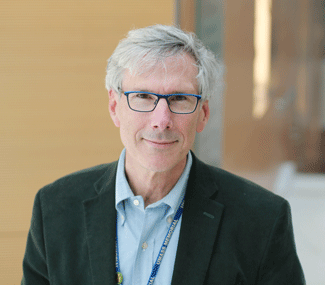 |
|
| Daniel Kirsch, MD |
UMass Medical School psychiatrist Daniel Kirsch, MD, is focused on improving mental health services for young adults aged 18 to 26 with a new initiative supported by a Vitality Award from the Office of Faculty Affairs.
“Every parent knows that by virtue of turning 18 a child does not become an adult, but we ignore this in mental health,” said Dr. Kirsch, clinical associate professor of psychiatry. “This group from the mid-teens through late mid-twenties is clearly different from adolescents and clearly different from older adults, despite the sharp line of demarcation between child and adult psychiatry at age 18.”
With mentorship from Douglas Ziedonis, MD, chair and professor of psychiatry; Sheldon Benjamin, MD, professor of psychiatry and the department’s vice chair for education; and Maryann Davis, PhD, research associate professor of psychiatry, Kirsch will:
- Create a curriculum for training psychiatry residents and fellows in college and young adult mental health;
- Increase the number of training opportunities for both child psychiatry fellows and adult psychiatry residents at UMass Medical School and clinical partner UMass Memorial Health Care; and
- Design an assessment tool that will help colleges evaluate the strengths and weaknesses of their own mental health services and create an action plan for change.
Kirsch has concentrated his clinical career on the formative phase in the lifespan that is neither fully child nor adult. Also known as transition age youth, young adults are generally defined as individuals approximately ages 18 to 25, many of whom can be found on America’s college and university campuses.
Nearly twenty million of the nation’s young adults attend colleges or graduate schools, representing the largest segment of the population of 18 to 25 year olds next to employed youth, according to the latest U.S. Census. There is both an urgent need and an unmet opportunity to help shepherd them through a time in life when major mental illnesses including depression, anxiety and substance abuse as well as schizophrenia and bipolar disorder first emerge. Seventy-five percent of all psychiatric illness manifests before age 24, accounting for the greatest portion of disability among young adults.
“It’s striking that all of the psychiatric diagnoses truly are disorders of youth,” Kirsch said. “But adult psychiatrists who treat them have little experience with the natural history of these illnesses since they only start seeing them at age 18, and there aren’t that many young adults who present for care.
One of seven inaugural UMMS Vitality Award recipients, Kirsch is expanding his own professional horizons in order to improve and expand the UMass College Consultation Service he established at UMMS in 1993. Today the service contracts with seven area colleges and universities that enroll a total of 33,000 students, providing direct student care, consulting to counseling center staffs and access to additional clinical resources at UMass Memorial Medical Center.
In its 2014 report Investing in the Health and Well-Being of Young Adults, the Institute of Medicine issued an urgent call to redesign young adult health care, including college mental health. (Dr. Davis was a member of the IOM report committee.)
“I realized that through my experience with college mental health, I have become an adult psychiatrist whose main area of interest—young adults—is the focus of this report, which resonated with me,” Kirsch said. “I think campuses are the best place to develop and implement innovative mental health services because students have many eyes on them, and colleges can offer many supports that communities at large do not have.”
Serendipity intervened when the Vitality Awards opportunity for mid-career and senior faculty became available.
“The problem of having so few services and well-trained professionals geared to our truly vulnerable youth means many college students and young adults are slipping through the cracks at a critical time in their lives,” Kirsch explained. “We must do better as a nation, and I want to be part of the solution, which means developing a trained workforce and helping institutions of higher learning and our mental health systems work together to provide the needed services for this vulnerable patient population.”
Funded by a grant awarded to the Office of Faculty Affairs from the Alfred P. Sloan Foundation to support faculty career flexibility plus in-kind support from the awardees’ departments, the Vitality Awards enable mid-career and senior faculty to acquire new skills and knowledge in research, education or clinical practice, and to advance the mission of the institution and ultimately improve the quality of patient care throughout the community.
From expanding local college mental health clinical services, to the ripple effects of pointing psychiatry residents towards careers with transition age youth, to creating a national model curriculum and assessment tool to enhance systems of care, Kirsch’s efforts could ultimately help more college students identify and cope with mental illness at a time when their ability to stay in school might make or break their future potential to be productive members of society.
“This is work I am deeply committed to, and for which there has been a longstanding need,” Kirsch concluded. “We are unusually well positioned here to create what could be a first-in-the-nation program.”
Related links on UMassMedNow:
UMass Medical School Faculty Vitality Award recipients announced
Expert’s Corner: College kids distressed or depressed? Consider all treatment options